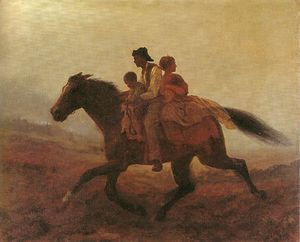Annotation:Pateroller Song (The): Difference between revisions
No edit summary |
No edit summary |
||
| Line 3: | Line 3: | ||
|f_tune_annotation_title= https://tunearch.org/wiki/Annotation:Pateroller_Song_(The) > | |f_tune_annotation_title= https://tunearch.org/wiki/Annotation:Pateroller_Song_(The) > | ||
|f_annotation='''PATEROLLER (SONG) [2], THE.''' AKA and see "[[Pateroller'll Catch You]]," "[[Run Boy Run]]," "[[Run Johnny Run]]," "[[Run Nigger Run]]," "[[Run Smoke Run]]." American, Reel and Song Tune. G Major. Standard tuning (fiddle). AABB. The song is reported to be about pre-Civil War times when plantation owners hired men to patrol for runaway slaves or slaves out after curfew without a pass. The tune was in the repertiore of the John Lusk Band, an African-American string band from Cumberland Plateau region of Ky./Tenn under the title "Pateroller'll Catch You." Hobart Smith's version is similar to "[[Salt River (2)]]," "[[Salt Creek]]," and, a bit more distantly, to "[[Lonesome John]]." See also related tune "[[Rattlesnake Bit the Baby]]." | |f_annotation='''PATEROLLER (SONG) [2], THE.''' AKA and see "[[Pateroller'll Catch You]]," "[[Run Boy Run]]," "[[Run Johnny Run]]," "[[Run Nigger Run]]," "[[Run Smoke Run]]." American, Reel and Song Tune. G Major. Standard tuning (fiddle). AABB. The song is reported to be about pre-Civil War times when plantation owners hired men to patrol for runaway slaves or slaves out after curfew without a pass. The tune was in the repertiore of the John Lusk Band, an African-American string band from Cumberland Plateau region of Ky./Tenn under the title "Pateroller'll Catch You." Hobart Smith's version is similar to "[[Salt River (2)]]," "[[Salt Creek]]," and, a bit more distantly, to "[[Lonesome John]]." See also related tune "[[Rattlesnake Bit the Baby]]." | ||
[[File:rideforliberty.jpg|300px|thumb|left|A Ride for Liberty: The Fugitive Slaves. Eastman Johnson, 1862. | [[File:rideforliberty.jpg|300px|thumb|left|A Ride for Liberty: The Fugitive Slaves. Eastman Johnson, 1862.]] | ||
|f_source_for_notated_version=Pete Sutherland [Phillips]. | |f_source_for_notated_version=Pete Sutherland [Phillips]. | ||
|f_printed_sources= Phillips ('''Traditional American Fiddle Tunes, vol. 1'''), 1994; p. 181. | |f_printed_sources= Phillips ('''Traditional American Fiddle Tunes, vol. 1'''), 1994; p. 181. | ||
Latest revision as of 03:57, 17 April 2023
X:0 T: No Score C: The Traditional Tune Archive M: K: x
PATEROLLER (SONG) [2], THE. AKA and see "Pateroller'll Catch You," "Run Boy Run," "Run Johnny Run," "Run Nigger Run," "Run Smoke Run." American, Reel and Song Tune. G Major. Standard tuning (fiddle). AABB. The song is reported to be about pre-Civil War times when plantation owners hired men to patrol for runaway slaves or slaves out after curfew without a pass. The tune was in the repertiore of the John Lusk Band, an African-American string band from Cumberland Plateau region of Ky./Tenn under the title "Pateroller'll Catch You." Hobart Smith's version is similar to "Salt River (2)," "Salt Creek," and, a bit more distantly, to "Lonesome John." See also related tune "Rattlesnake Bit the Baby."


